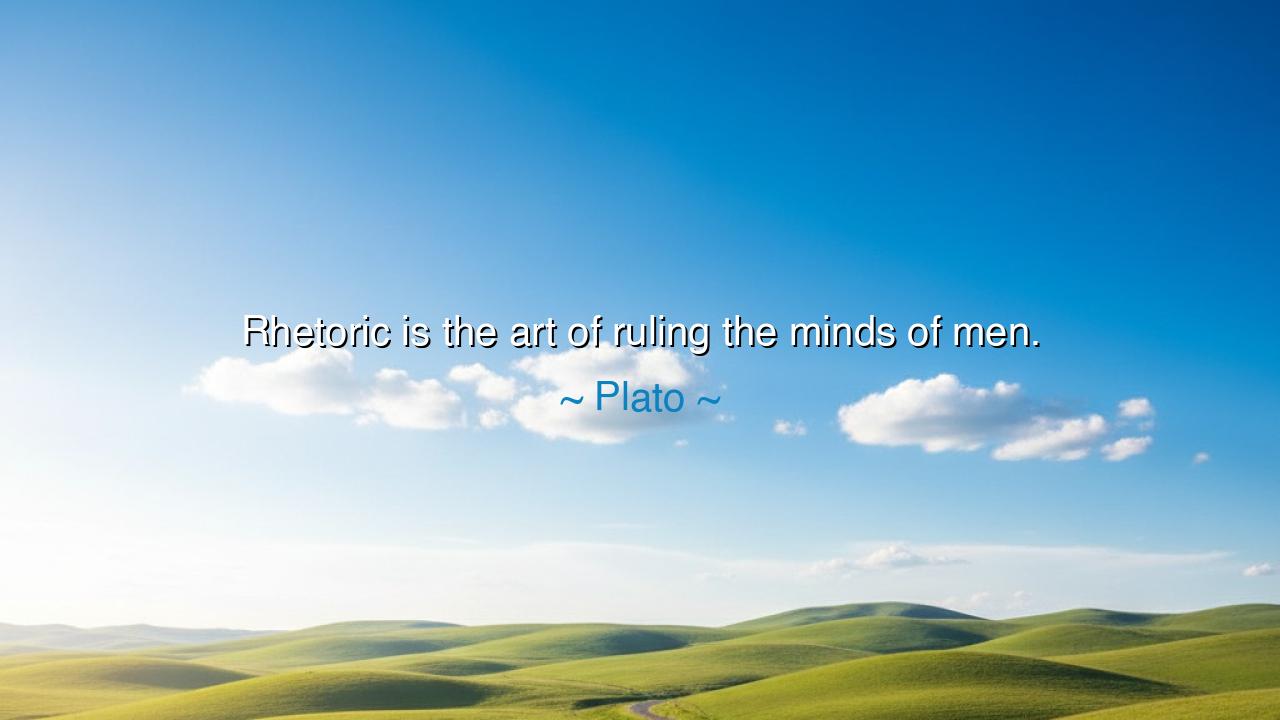
Rhetoric is the art of ruling the minds of men.






Opening Scene
The room is quiet, with only the occasional hum of traffic from outside to break the stillness. The soft glow of the lamp casts long shadows across the room, creating an atmosphere of deep thought. Jack is sitting at the table, a notebook in front of him, his pen tapping absentmindedly against the surface. Jeeny is standing near the window, her arms crossed as she gazes out at the street below, her expression far away, lost in thought.
Host: There’s a sense of unspoken curiosity between them, a question hovering in the air, waiting to be explored. Finally, Jeeny turns, her voice breaking the silence.
Jeeny: “You ever think about the power of language? Not just how we communicate with each other, but how words can shape thoughts, influence people, even shape entire societies?”
Jack: “All the time. It’s like what Plato said, ‘Rhetoric is the art of ruling the minds of men.’ It’s strange, isn’t it? How words can carry such power. It’s not just about conveying information — it’s about shaping how people think, how they perceive the world.”
Jeeny: “Exactly. Rhetoric isn’t just speaking; it’s about influencing, about controlling the narrative. If you can control how people think, you can control their actions, their decisions, even their beliefs. It’s not about facts, it’s about persuasion.”
Jack: “And that’s what makes rhetoric so dangerous, isn’t it? When you understand how to speak in a way that influences people on a deep level, you can manipulate them, make them believe something that might not even be true. The way words can shift perspectives, change minds... it’s powerful.”
Host: The conversation feels heavier now, the weight of Plato’s words settling between them. Jack looks out the window, his gaze thoughtful, as though trying to wrap his head around the idea of rhetoric not just as speech, but as a tool of control.
Jack: “But do you think that’s always bad? I mean, rhetoric is everywhere — in politics, in media, even in everyday conversations. If used for the right reasons, could it be a force for good?”
Jeeny: “It’s possible. Rhetoric, like any tool, can be used for both good and bad. The danger is when it’s used to manipulate people for selfish gain, when it’s used to create division, fear, or control. But if used ethically, if it’s about empowering people, inspiring them to think critically or act for the greater good, it can be incredibly powerful in a positive way.”
Jack: “That’s the tricky part, though. How do you know when rhetoric is being used for good and when it’s being twisted to fit a narrative that serves someone else’s agenda?”
Jeeny: “It comes down to intention. Is the goal to help people make informed decisions, to raise awareness, or to empower them? Or is it about manipulating them into accepting a specific point of view, one that benefits only a few at the top? That’s where we have to stay vigilant. We have to recognize the difference.”
Host: There’s a quiet understanding between them now, a realization that rhetoric, in its purest form, is not inherently bad. It’s how it’s used, the intent behind it, that determines its power. The world outside continues to move, but inside, Jack and Jeeny are caught in the understanding that words are not just tools of communication; they are tools of influence.
Jack: “So, it’s not just about the message, but about the way the message is delivered, right? The emotional appeal, the structure, the way it taps into people’s fears or hopes. It’s like the art of persuasion — the ability to move people without them even realizing it.”
Jeeny: “Yes. And the more we understand how rhetoric works, the more we can be aware of it. We can question the motives behind the words we hear, whether they’re coming from politicians, marketers, or even people close to us. If we don’t recognize the power of rhetoric, we’re vulnerable to manipulation.”
Jack: “It’s kind of a double-edged sword, though. Rhetoric can be used to manipulate, but it can also be used to enlighten. It’s all about how we use it, how we wield the power of words. The question is: Are we using rhetoric to inform, or are we using it to control?”
Host: The air between them feels charged now, as though the conversation has sparked a new awareness. The quiet hum of the city outside becomes a distant backdrop to their thoughts. The power of language, of words to influence, control, and even empower, has taken root in their minds.
Jeeny: “In the end, I think it’s up to each of us to be responsible for how we use rhetoric. To be aware of the power it holds, and to make sure we’re using it for the right reasons. Whether we’re speaking, writing, or even listening, we need to be conscious of what’s being said and what it’s trying to make us feel or believe.”
Jack: “And that’s where the danger lies — in not questioning the messages we’re being given, in not realizing how easily we can be swayed by the right words, delivered in the right way.”
Host: The room grows quieter now, the conversation settling into a new understanding. The world outside continues, but inside, there is a deeper awareness of the role that language plays in shaping not just conversations, but entire worlds. Rhetoric is not just a tool of communication — it is the art of shaping minds, and with it, the power to both enlighten and control.






AAdministratorAdministrator
Welcome, honored guests. Please leave a comment, we will respond soon